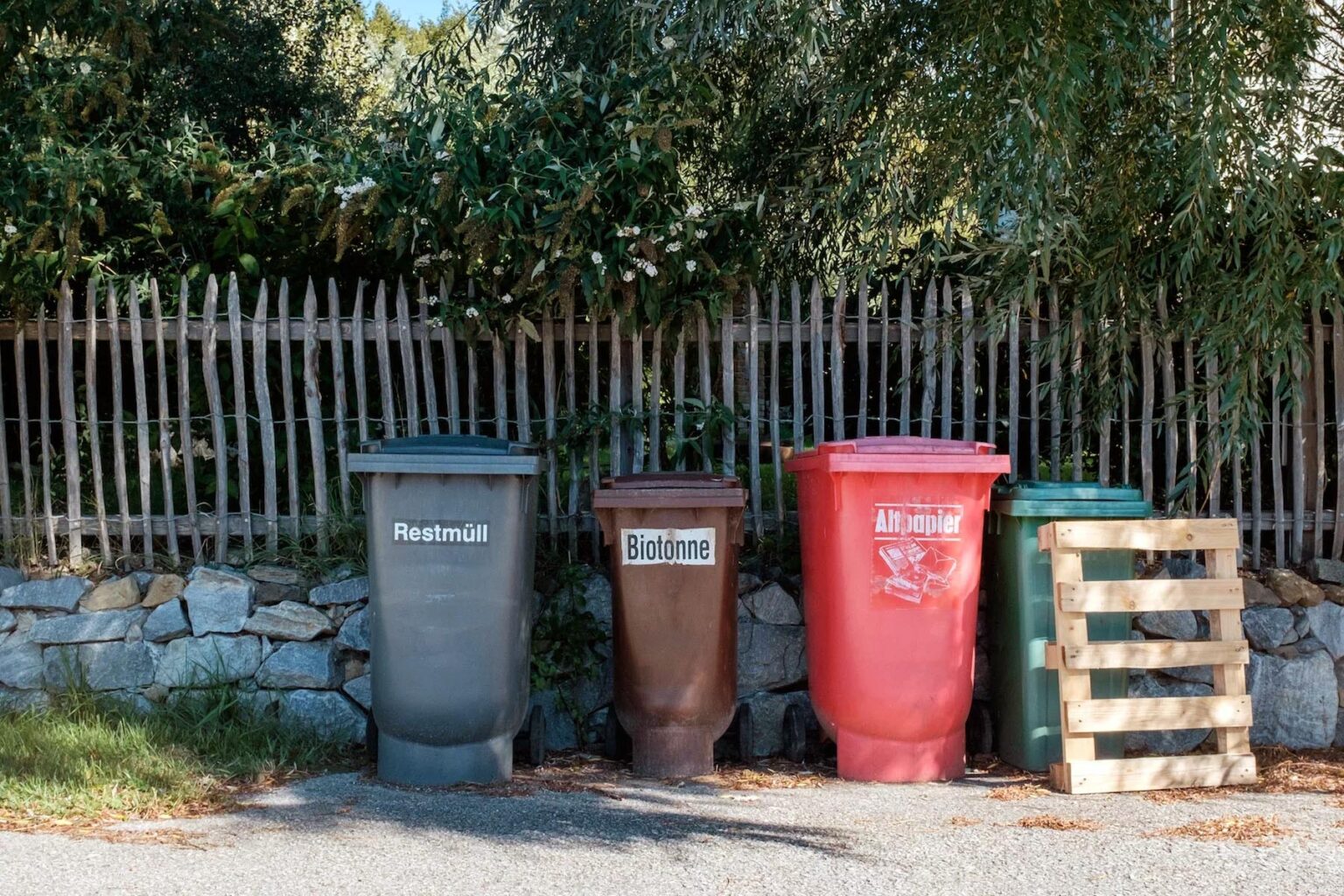If you are an expat living in Austria, you’ll face all manner of small, everyday challenges in your life. For instance, setting up your home utilities and finding your nearest grocery store are some things you simply need to know. And while garbage collection and recycling might not be the most glamorous aspect of life in Austria, it’s still essential to know. Beyond this, you might also want to read up on the circular economy and how to live more sustainably in Austria. Then, of course, there are some handy ways to reduce plastic in your everyday life.
But first, here is everything you need to know about garbage collection and recycling in Austria, including the following:
The recycling system in Austria
Generally, Austrians are very good at recycling, both on a government and individual level. In fact, according to a Euro-barometer survey, 96% of Austrians claim they separate their general waste from packaging. Furthermore, 99% take measures to separate paper from other waste. Altogether, households in Austria sort more than a million tonnes of recyclables every year. Additionally, recycling is paid through municipal taxes in each district. And similar to Germany, Austria has a producer responsibility model. The biggest company running this system is Altstoff Recycling Austria (ARA). This provides a pick-up service for 1.6 million households, as well as public drop-off points for different types of recycling in the country.
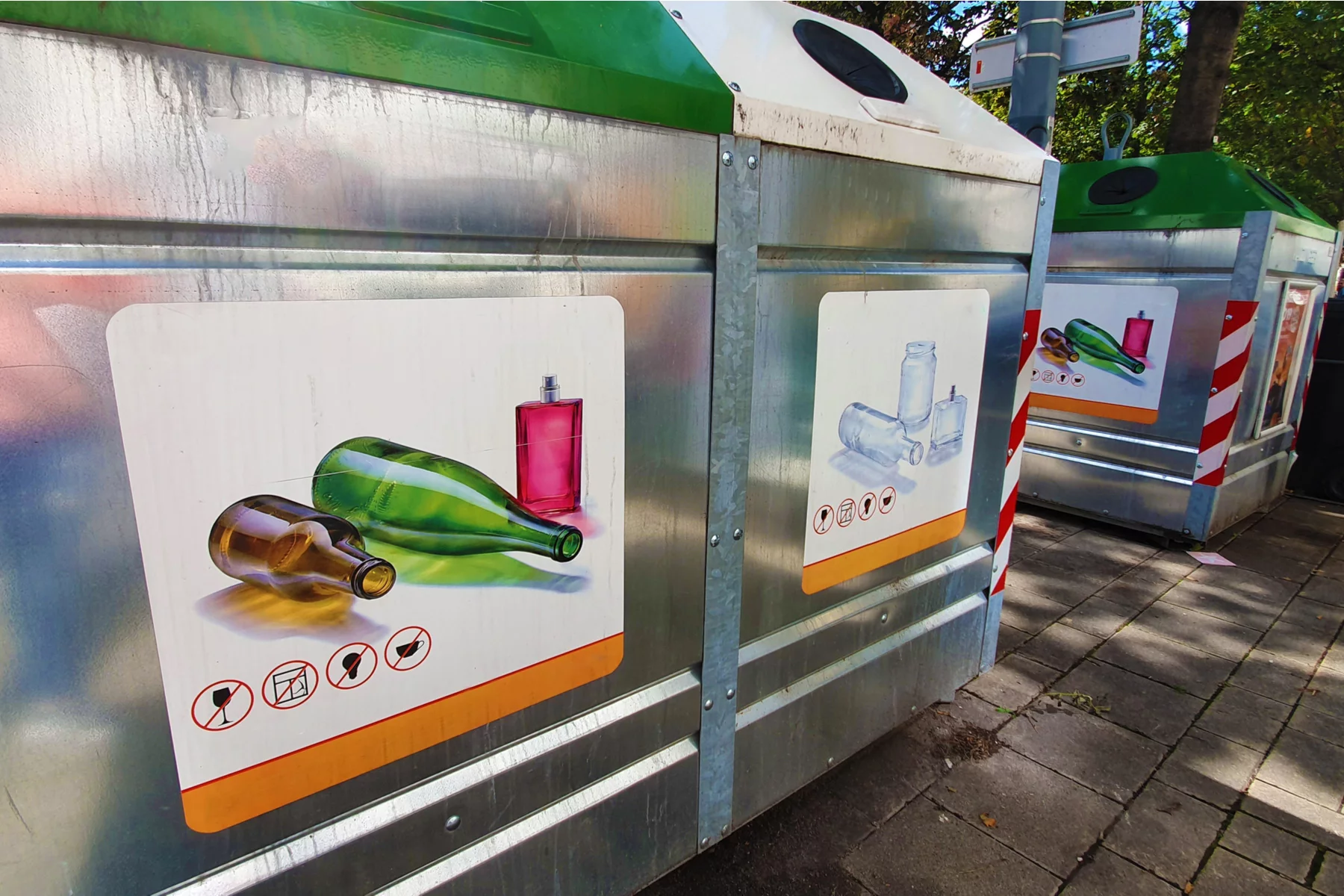
Austria has a blanket ban on certain types of waste going to landfill. This includes any product that has a total organic carbon emission rate of more than 5%. This effectively prevents any packaging from ending up in the soil. Since January 1, 2020, Austria also has a ban on plastic bags.
In Austria, recycling is sorted into organic waste, waste paper, and plastic packaging. However, metal packaging and glass are separate, and you must sort glass by color. Hazardous materials such as batteries are also separate. Everything else goes into black residual waste bins. In Austria, electric garbage trucks collect waste.
How to recycle in Austria
In a nutshell, Austrians are big on recycling. Large cities such as Vienna have a well-organized color-coded recycling bin system that applies to both street bins and households. In fact, this is a high priority in Austria and includes bins for paper, plastic, and organic waste for each residence. Meanwhile, glass and metal waste containers are usually within close walking distance.
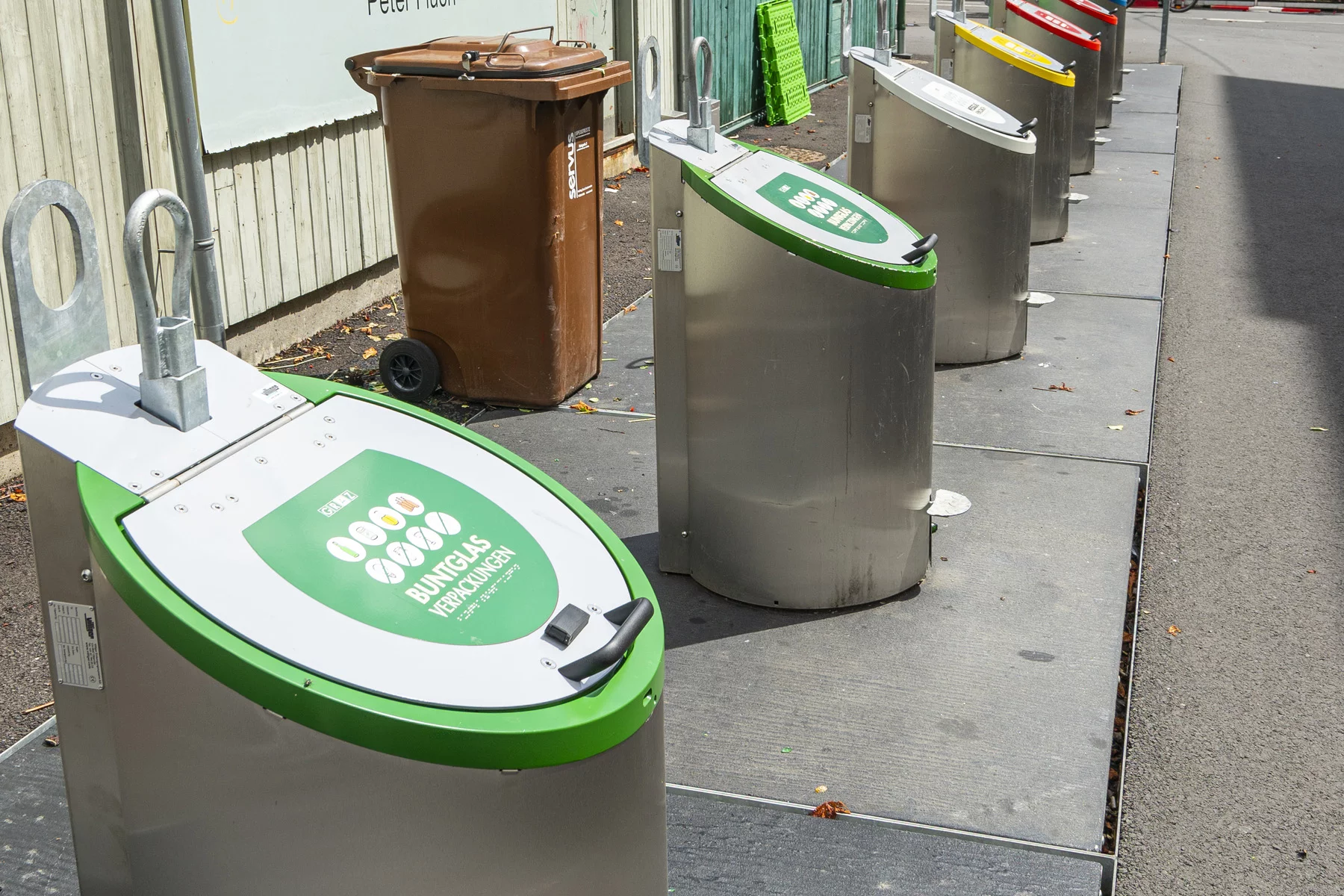
You can check out The ABC’s of Vienna’s Waste for a comprehensive look at the recycling system in Austria. However, bear in mind that each municipality has slight variations on this; therefore, it’s a good idea to check the details for where you plan to live.
Recycling paper in Austria
Altstoff Recycling Austria AG (ARA) is Austria’s leading collection and recovery system for packaging. Astoundingly, the company collects 600,000 tonnes of paper from packaging every year. Interestingly, households account for a third of this with industry and business making up the other two-thirds. They collect this together with newspapers and other print products from the 1.4 million red containers around Austria. These red bins are located either directly at households or placed in designated public areas around cities. On average, there is one paper wheelie bin for every six Austrian residents.
Paper packaging collected by ARA is recycled into new raw materials. These can be used in almost all types of paper products. However, the paper quality does deteriorate each time it is recycled. Amazingly though, paper fibers can be recycled around six times. Additionally, some types of packaging in Austria are made almost entirely of waste paper.
In Austria, you can pop the following waste items in these red bins:
- egg cartons
- notebooks and exercise books (without the plastic cover)
- magazines
- cardboard
- catalogs (without the plastic envelope)
- copying paper
- cardboard fruit trays
- paper towels (clean)
- paper carrier bags and packaging
- cardboard boxes
- corrugated cardboard
- newspapers
Notably, there are a few things that you shouldn’t place in the red paper bins. These include handkerchiefs, kitchen towels, contaminated
or greasy paper, and any coated cardboard packaging such as milk cartons.
Recycling plastic in Austria
Essentially, there are two recycling schemes for households in Austria. For approximately 60% of Austrians, plastic packaging is collected in yellow bags or bins along with wood, textiles, ceramics, and biodegradable material packaging. Specifically, plastic packaging is sorted into different types and sent for recycling. The packaging is shredded, washed, dried, melted, and processed into new products.
In Vienna, Lower Austria, Salzburg, and Carinthia, bottles made of polyethylene terephthalate (PET) are collected for direct bottle-to-bottle recycling. Before you put your plastic bottles in the bin, you should squeeze and flatten them first; this saves space in the collection trucks.
In Austria, 75% of PET bottles end up in the designated yellow recycling bins. You can also place the following items in these bins:
- styrofoam
- cellophane wrappers
- disposable cutlery
- plastic cups
- empty toner cartridges
- any plastic carrier bags you can’t reuse
Meanwhile, small plastic packaging is collected together with general waste and incinerated at waste incineration plants. The energy produced is used in public buildings and district heating networks. Amazingly, one kilogram of plastic packaging has approximately the same calorific fuel value as one liter of oil.
Recycling glass in Austria
Did you know? Recycling one glass bottle saves enough energy to power a laptop for 25 minutes! Now there’s a reason to recycle!
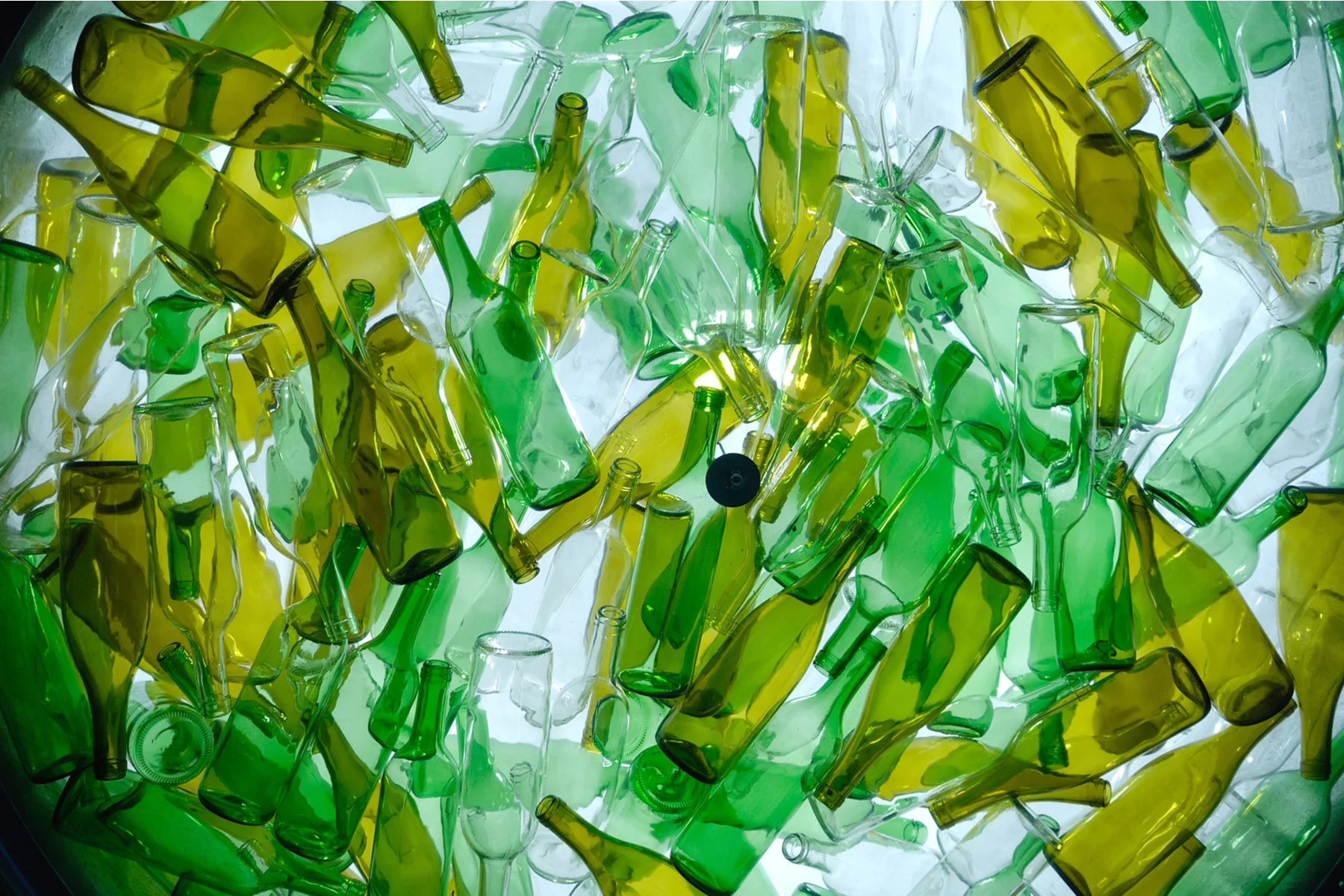
Ordinarily, for households in Austria, clear and colored glass is collected separately in one container with two compartments. The recycling truck picks up the bin which automatically separates the two sides into the truck. In street bins, the white bin holds Weissglas (clear bottles and jars), while the green bin collects Buntglas (stained glass); for instance, colored glass bottles, glass flasks, storage jars, cosmetic packaging, and medicine bottles.
The separation is very important as just one green bottle put in the clear bin is enough to contaminate 500kg of clear glass recycling!
It is also important to know that you shouldn’t put any of the following items in the glass bins:
- crockery
- vases
- glass plates
- drinking glasses
- mirrors
- light bulbs
- glass containers with toxic contents
The AFA melts recycled glass then turns it into new glass products. Remarkably, up to 100% of green glass and 60% of clear glass is recycled in Austria.
Recycling metal in Austria
In Austria, metal recycling is collected in blue bins that are located all over the country at central collection points. Interestingly, some regions, such as Klagenfurt, collect metal packaging together with plastic packaging. These go in the yellow bins to sort later. You can out the following items in the blue metal recycling bins:
- tin cans
- aluminum foil
- metal screw tops
- empty aerosol cans
- yogurt tub lids
- coffee packaging
However, you shouldn’t put in oil or varnish cans, gas cartridges, household appliances, or bicycle parts.
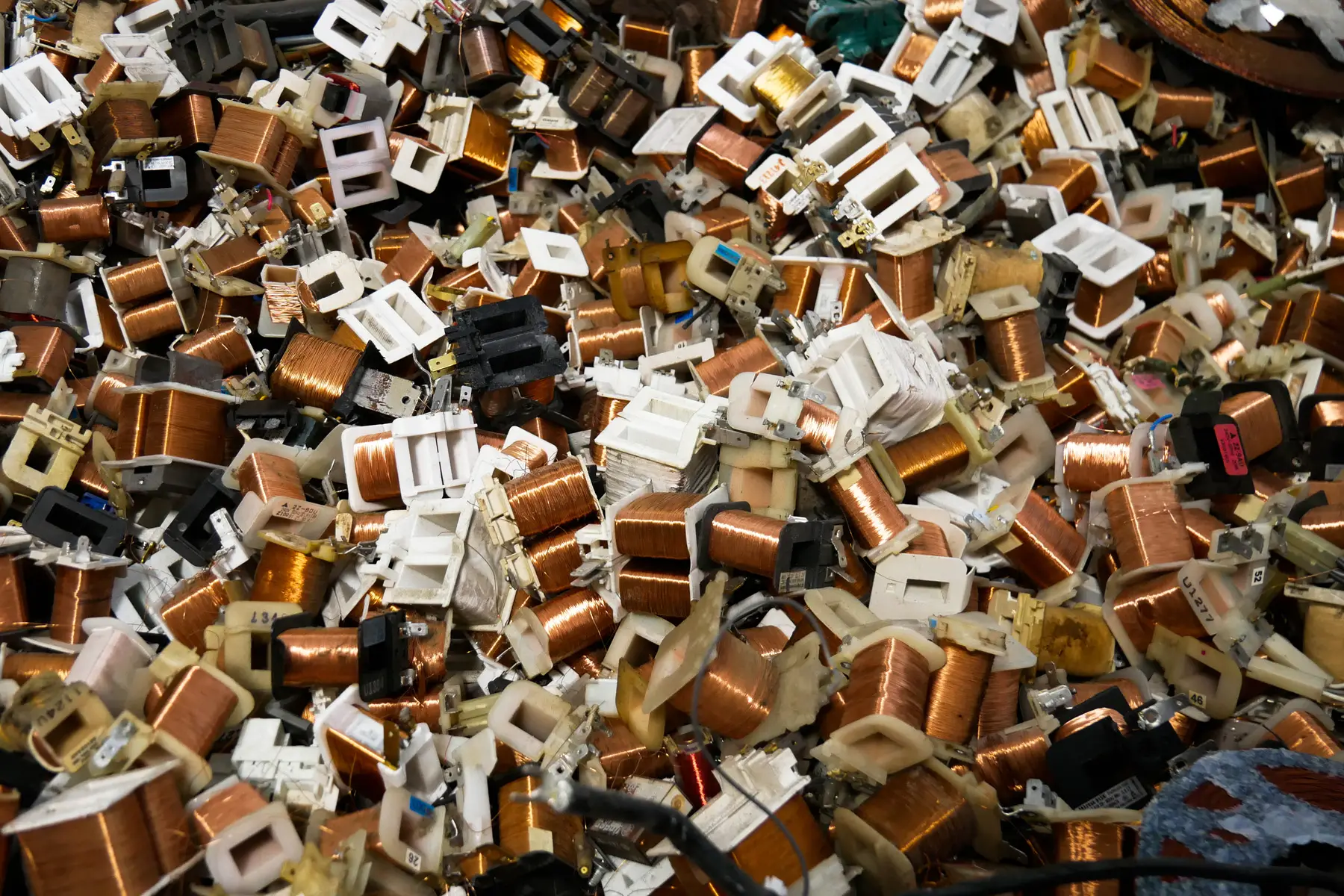
Uniquely, you can recycle aluminum infinitely while retaining its properties. Anything that contains more than 50% aluminum can be melted and re-cast. Interestingly, the melting of recycled aluminum only takes 5% of the energy that is necessary to produce virgin aluminum. Furthermore, the recycling of one can saves enough energy to power a laptop for three hours! With this in mind, it certainly seems worth doing, particularly when Austria makes it so easy. Other types of metal are collected and shredded accordingly, and often mixed with other materials to make steel. This saves energy and materials and avoids contributing to landfill waste.
Recycling clothes and clothing materials in Austria
There are several major clothing charities that accept donations in Vienna, as follows:
- Kolping Österreich – you will see Kolping clothes donation bins around Vienna. This organization supports young people having a tough time. If they can’t pass your clothes on to someone who needs them, they recycle them with other textiles.
- Flüchtlingsprojekt Ute Bock – a charity for refugees and asylum seekers in Vienna, which provides clothing to those in need
- Tageszentrum am Hauptbahnhof – part of Caritas International, this charity accepts clothes donations for homeless people
- VinziRast-Notschlafstelle – donations go to homeless people staying at their night shelter
- VinziShop Wien – they sell clothes and the money goes to help the needy
- Verein Hilfe und Hoffnung – they have a clothing collection in Vienna and donate clothes to people in need in Hungary, Romania, and Ukraine
Recycling food and garden waste in Austria
Austria has an organic waste compost program that operates throughout the country. Depending on which state you live in, the compost bin will be brown or green; in Vienna, for example, it is green. This bin is for fruit and vegetable scraps, fruit peel, coffee grounds and tea bags, garden waste, and paper kitchen towels. The scraps go to composting plants for use as garden trimmings and similar projects, like the biogas plant.
You must dump your organic waste directly into the bin, never throwing in plastic bags or other containers. You can place the following items in the compost bin:
- tree
- shrub and lawn cuttings
- leaves
- plant residues
- unspiced and uncooked fruit and vegetable leftovers
- potting soil
- old bread
- coffee and tea brews
However, don’t put meat, bones, eggs, dairy, vacuum cleaner contents, cat litter, or any plastic bags in the compost bin.
Recycling other household items in Austria
You can take other items, including harmful substances, to your community waste collection center directly. These include:
- batteries
- energy saving lamps
- medicines
- paints
- pesticides
- glue
You can visit this website to find a timetable of dates and locations to hand in harmful waste.
What happens to recycled materials in Austria?
As mentioned, most recyclables are either transformed into new versions of the same material or into new items altogether. That said, the country was among 10 other European nations that sent toxic electronic waste illegally to developing countries like Nigeria and Thailand.
Recycling tips in Austria
The best tip for recycling in Austria is to be diligent. After all, the country makes it very easy to recycle with its bin separation system; so you have no excuse for not doing it properly. However, just remember, there will be slight variations throughout different regions of Austria. Therefore, it is best to have a look at your individual municipality website for further information.
Garbage collection in Austria
Each municipality in Austria has its own waste management company. You can also order additional emptying for a volume-based fee.
Uniquely, Austria has a free mobile app called Müllapp (TrashApp) which helps with garbage collection. The app covers several Austrian cities with its useful services. For example, users can organize their own garbage collection and the app will remind them to put their bins outside on the chosen day. It also provides updates from the city council as well as information about where to find nearby containers. The app also tells you where to dispose of old clothes and provides details of other specific waste management sites.
Penalties for illegally dumping waste or recycling in Austria
It is important to know that there are some pretty severe penalties for fly-tipping in Austria. For example, there is a fine of up to €36,340 or two years in prison for unlawfully dumping waste. Similarly, the penalty is the same for the unlawful discharge of hazardous substances into the water. Therefore, it is safe to say that the Austrian authorities take waste management very seriously. They also expect the country’s citizens to do the same. This is why Vienna remains one of the cleanest cities in the world.
Useful resources
- Austria Recycling – the Association for the Promotion of Recycling and Environmental Protection in Austria
- European Environment Agency – the European Environment Agency (EEA) provides independent information on the environment in Europe
- Muelltonne – find information on the different types of waste including a waste separation database for Austria
